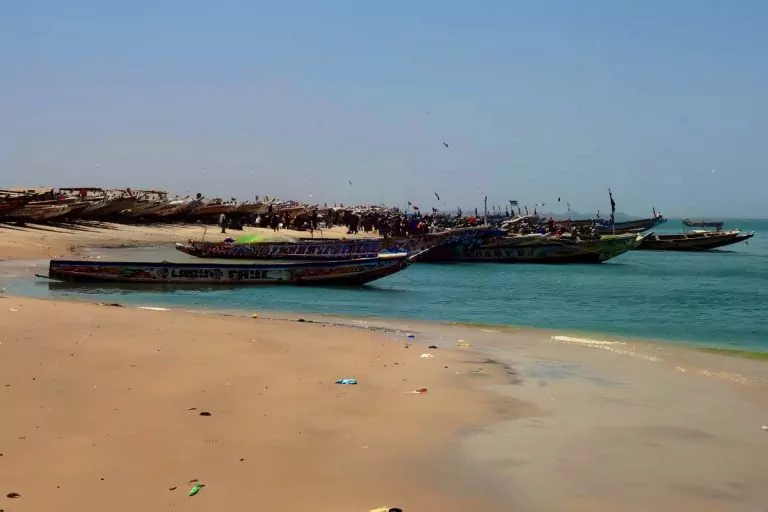Impact Story
Ocean Data for Coastal Futures
PULSE empowers West African communities with affordable data for sustainable coastal management.
Over 70% of the global population will live in coastal regions within the coming decades, yet much of the coastal ocean remains poorly observed. In regions like West Africa, limited data stems from the high costs, complexity, and expertise needed for marine monitoring, posing challenges to achieving marine biodiversity and climate-related Sustainable Development Goals. To address this issue, PULSE partnered with the Senegalese government to provide accessible, user-friendly coastal data. The project supports data-driven decision-making, improves fisheries forecasting and helps current and future efforts to mitigate and adapt to climate change. By enhancing data availability, PULSE aims to boost coastal management and improve the quality of life for local communities.
What unique issue is PULSE addressing?
Many fish in the world’s oceans are affected by altered climate conditions such as higher temperatures and lower oxygen levels. Consequently, the livelihood of local fishers is impacted by decreased yields. Despite the growing recognition of the urgent need to change habits and make science-based decisions on climate change, the availability of user-friendly, robust, and cost-effective instruments remains a limiting factor for coastal ocean observation.
PULSE has introduced a concept of deploying low-cost sensors in Senegalese communities to enable fishermen who are already in open waters on a daily basis to measure marine parameters such as temperature, salinity, oxygen, and currents to predict the likelihood of fish occurrence and test the usefulness of common practices.
In collaboration with regional and international experts, these sensors have been adapted to the needs and constraints of the Senegalese coastal region and maintenance procedures have been developed to ensure sustainable use, from deployment to validation and data sharing via easily accessible public tools.
PULSE’s strong partnerships
- Laboratory of Atmospheric Physics and Ocean Siméon Fongang (LPAOSF-ESP) at Cheikh Anta Diop University of Dakar (UCAD)
- Alfred-Wegener-Institut, Helmholtz-Zentrum für Polar- und Meeresforschung (AWI)
- Institut de Recherche pour le Développment (IRD)
What has PULSE achieved?
PULSE has been able to:
- develop a concept fitted to the region for sustainable use and maintenance of cost-efficient sensors and test the sampling and dissemination procedure as a blueprint for further projects and applications.
- strengthen a binational partnership for the shared use of coastal/oceanographic data observation protocols between the German (AWI) and Senegalese (LPAOSF-ESP) partner institutes that will be continued beyond the project.
- organise several successful workshops with the active engagement of policymakers and members of the fishing community as stakeholders.
What else has been achieved?
Further, PULSE has:
- conducted a total of three modules on low-cost and cost-efficient sensors in cooperation with the NF-POGO Centre of Excellence, trained 30 persons from different countries and developed DIY videos and a best practise handbook.
- adjusted the planned measures according to the requirements of the local fishers and created an additional sampling and sensor set up to monitor the sediment movement and erosion before and during the construction of a harbour.
- defined a set of specifications with the stakeholders, outlined the preconditions and planned a mobile application as a tool for data dissemination in close cooperation with potential developers.
In what way has PULSE built lasting local capacities?
The warming of oceans is challenging fishermen in both Senegal and Germany. To ensure long-term benefits from the PULSE project, a collaboration agreement was established between German and Senegalese institutes. The project also fostered personal connections, bringing together a German and a Senegalese fisherman to share experiences.
Local authorities adapted the concept of the project as a powerful tool to use the results for their own activities and decisions. In addition, the project outcomes were implemented on the innovation platform SOOP (Shaping an Ocean Of Possibilities) for future use. Further workshops and events as well as educational units and training modules are planned to enable a sustainable use of the cost-efficient devices, spread further awareness and raise future funding.
PULSE published scientific presentations, posters and handbooks on low-cost data collection for sustainable coastal management.
PULSE convened stakeholders from a range of target groups in Senegal and beyond.
How has PULSE affected the regional communities?
Project PULSE has been able to successfully strengthen exchanges between researchers and stakeholders such as decision makers, fishermen and local communities. The project’s participatory and inclusive approach proved to be beneficial: During the co-design process, stakeholders were able to express their needs and the focus of the project could be shifted accordingly, to include parameters as valuable source of information for marine construction building and the fishing communities. The project has also raised awareness among policymakers of the existence of low-cost sensors that can be used to better comprehend the ocean and thus make appropriate decisions for sustainable development. The project’s focus on local capacity development will ensure long-term benefits for the coastal communities who can use the learnings and skills to facilitate and ensure coastal management better adapted to climate change in the future. By taking the pulse of the ocean, the project could contribute to better understand the heart of the coastal regions.

